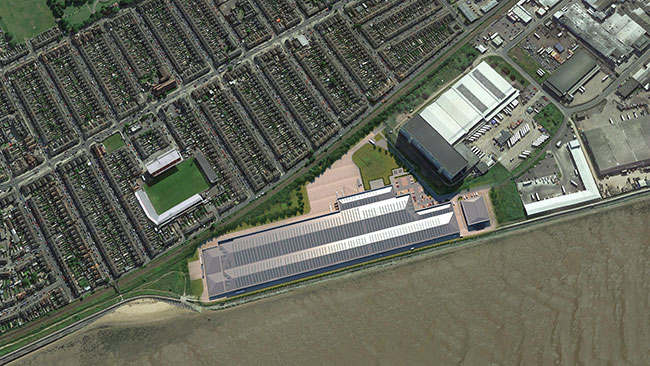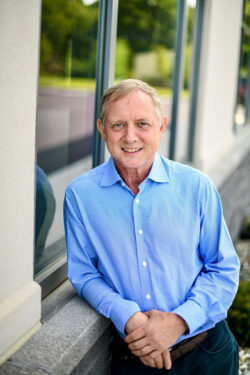
Features
£100M RAS is ready to go in the UK
November 30, 2023 By Colin Ley
 Aerial view of propsed site plan
Photos: Aquacultured seafood
Aerial view of propsed site plan
Photos: Aquacultured seafood A multi-million dollar RAS salmon farm is scheduled for development in Grimsby, on the east coast of England, with the promise that it will feature state-of-the-art technology.
The company behind the development is Aquacultured Seafood Ltd., whose directors have already commissioned the Israel-headquartered AquaMaof Technologies to give the new unit its exalted technology edge.
The Grimsby project is set to become the UK’s first major salmon farm outside Scotland with its planned east coast location, close to the busy port of Hull, being the result of extensive site research covering the length and breadth of the country. The project is meant to establish the Lincolnshire town as a pioneer of UK aquaculture and reinforce its reputation as Europe’s seafood capital.
First submitted for planning authorities at North East Lincolnshire Council in December 2022, and the focus of a free-access public meeting in May this year. During a council meeting on Nov. 29, the project officially received the green light with the council voting 7-4 in favour of the decision. Four councillors voted in favour of delaying construction and commissioning an Environmental Impact Assessment.
Despite the slow pace of this part of the process, Aquacultured Seafood’s development prospectus remains upbeat and expansive, declaring that an initial seed round to raise in excess of £100 million (US$125 million) to support the project has already been successfully completed and that a second investment raise is being prepared, dependent on the planning application being successful.
Presented to the local public meeting as a 5,000-tonne-a-year output venture, the development is also profiled as being capable of generating “at least £100 million inwards economic investment” while creating 100 new jobs for the local area.
Asked by RAStech to expand on their top-grade technology claims, Aquacultured Seafood director, Mike Berthet, said that with AquaMaof is due to build several RAS system iterations before embarking on the Grimsby project. He was confident there will be “a number of enhancements” by then “as technology moves forward.”
“Having evaluated many other technology providers, we chose AquaMaof for their ability to demonstrate a successful, commercial version of a salmon farm at their facility in Poland,” he said. “They have also helped enormously with their technical know-how to provide the platform for Proximar Seafood in Japan, which has also given our Grimsby team insight into how they operate, which clearly fits with our own expectations.”

Mike Berthet, director of AquaCultured Seafood
On the question of how much ongoing advances in artificial intelligence (AI) will play in the final Grimsby unit, Berthet added: “The pace at which AI is expanding will no doubt mean that it will be in the mix in relation to various parts of our project: design and operation, feed formulation, genetics, or helping in ways we cannot yet imagine. We will certainly be exploring how this new part of the fourth Industrial Revolution may be able to out-perform the methodology which is currently available to us.”
A high priority challenge for Berthet and fellow his directors, Craig Anderson and James Fox Davies, has been to present the benefits of their planned project to local officials and the general public, faced with inevitable questions over the potential disruption the development might cause.
Dealing with issues such as site noise, smell and the potential impact on the local wildlife, the company prospectus said it embraces each in turn, declaring noise to have been independently assessed as “low impact,” smell as set to be “controlled within the facility,” and wildlife issues to have been subject to surveys in 2021 in accordance with Chartered Institute of Ecology and Environmental Management. It is also declared that, where possible, wildlife habitats will be created within the proposed layout to provide additional ecological interest.
In addition, the prospectus states that the optimum location for a UK-based onshore aquaculture farm has the following attributes:
- Strong knowledge of fishing and food processing sectors close to the site.
- Proximity to existing food processing facilities to significantly reduce food miles for:
- reduced environmental impact.
- increased freshness of seafood when delivered to processors.
- Proximity to saline and freshwater sources.
- Near food waste processors.
In this context, Aquacultured Seafood makes the point that Grimsby ticks a lot of boxes by virtue of the town’s 1,000 years of fishing heritage. There are already 6,000 local jobs linked to fishing and fish processing and 70 per cent of UK salmon is already processed in the area.
“The future of sustainable fish farming in ‘Great Grimsby’ is now within reach,” concludes the company, setting the scene for an early start to the development once the planners give the final go-ahead.
Print this page